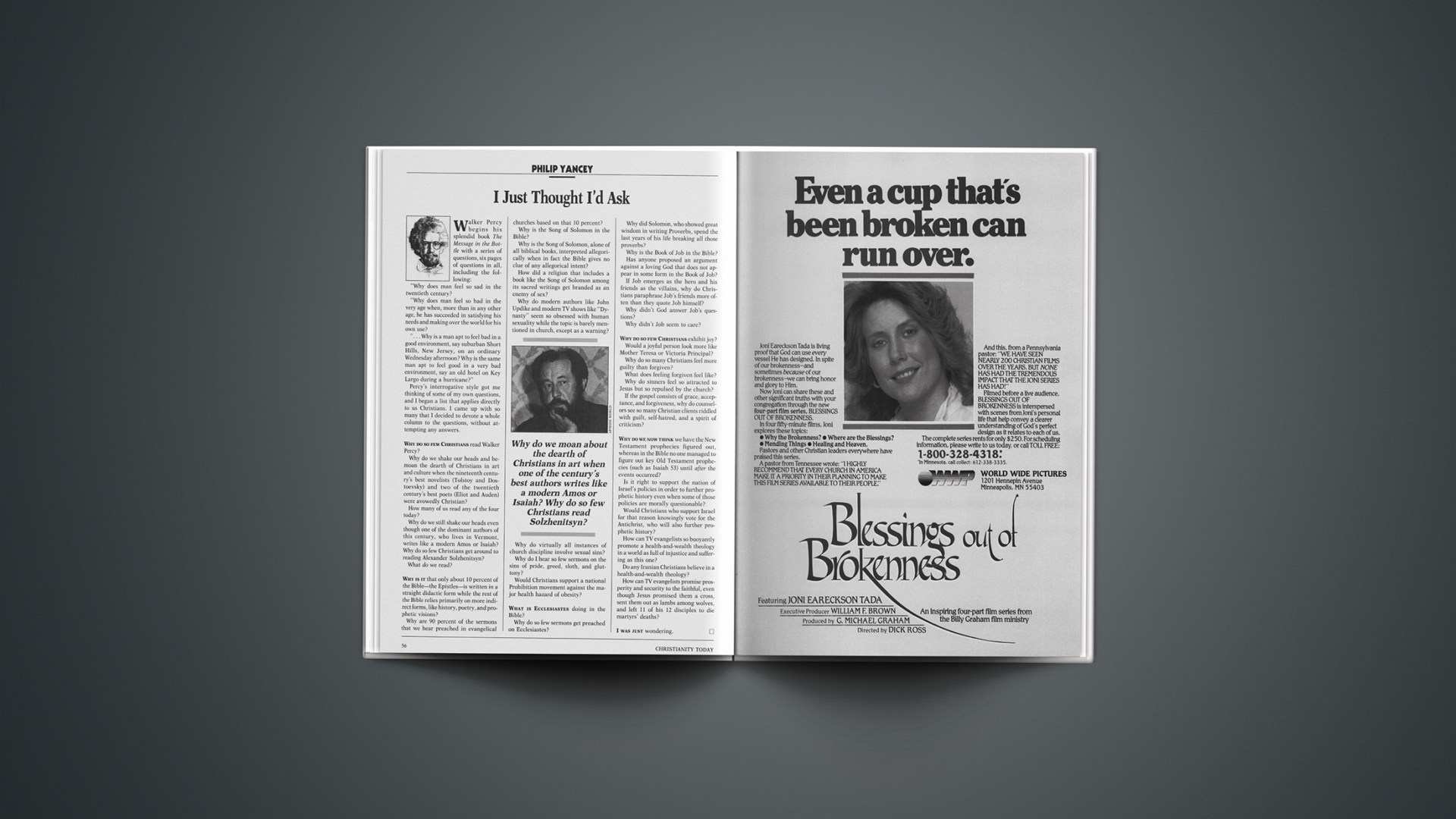Walker Percy begins his splendid book The Message in the Bottle with a series of questions, six pages of questions in all, including the following:
“Why does man feel so sad in the twentieth century?
“Why does man feel so bad in the very age when, more than in any other age, he has succeeded in satisfying his needs and making over the world for his own use?
“… Why is a man apt to feel bad in a good environment, say suburban Short Hills, New Jersey, on an ordinary Wednesday afternoon? Why is the same man apt to feel good in a very bad environment, say an old hotel on Key Largo during a hurricane?”
Percy’s interrogative style got me thinking of some of my own questions, and I began a list that applies directly to us Christians. I came up with so many that I decided to devote a whole column to the questions, without attempting any answers.
WHY DO SO FEW CHRISTIANS read Walker Percy?
Why do we shake our heads and bemoan the dearth of Christians in art and culture when the nineteenth century’s best novelists (Tolstoy and Dostoevsky) and two of the twentieth century’s best poets (Eliot and Auden) were avowedly Christian?
How many of us read any of the four today?
Why do we still shake our heads even though one of the dominant authors of this century, who lives in Vermont, writes like a modern Amos or Isaiah? Why do so few Christians get around to reading Alexander Solzhenitsyn?
What do we read?
WHY IS IT that only about 10 percent of the Bible—the Epistles—is written in a straight didactic form while the rest of the Bible relies primarily on more indirect forms, like history, poetry, and prophetic visions?
Why are 90 percent of the sermons that we hear preached in evangelical churches based on that 10 percent?
Why is the Song of Solomon in the Bible?
Why is the Song of Solomon, alone of all biblical books, interpreted allegorically when in fact the Bible gives no clue of any allegorical intent?
How did a religion that includes a book like the Song of Solomon among its sacred writings get branded as an enemy of sex?
Why do modern authors like John Updike and modern TV shows like “Dynasty” seem so obsessed with human sexuality while the topic is barely mentioned in church, except as a warning?
Why do virtually all instances of church discipline involve sexual sins?
Why do I hear so few sermons on the sins of pride, greed, sloth, and gluttony?
Would Christians support a national Prohibition movement against the major health hazard of obesity?
WHAT IS ECCLESIASTES doing in the Bible?
Why do so few sermons get preached on Ecclesiastes?
Why did Solomon, who showed great wisdom in writing Proverbs, spend the last years of his life breaking all those proverbs?
Why is the Book of Job in the Bible?
Has anyone proposed an argument against a loving God that does not appear in some form in the Book of Job?
If Job emerges as the hero and his friends as the villains, why do Christians paraphrase Job’s friends more often than they quote Job himself?
Why didn’t God answer Job’s questions?
Why didn’t Job seem to care?
WHY DO SO FEW CHRISTIANS exhibit joy?
Would a joyful person look more like Mother Teresa or Victoria Principal?
Why do so many Christians feel more guilty than forgiven?
What does feeling forgiven feel like?
Why do sinners feel so attracted to Jesus but so repulsed by the church?
If the gospel consists of grace, acceptance, and forgiveness, why do counselors see so many Christian clients riddled with guilt, self-hatred, and a spirit of criticism?
WHY DO WE NOW THINK we have the New Testament prophecies figured out, whereas in the Bible no one managed to figure out key Old Testament prophecies (such as Isaiah 53) until after the events occurred?
Is it right to support the nation of Israel’s policies in order to further prophetic history even when some of those policies are morally questionable?
Would Christians who support Israel for that reason knowingly vote for the Antichrist, who will also further prophetic history?
How can TV evangelists so buoyantly promote a health-and-wealth theology in a world as full of injustice and suffering as this one?
Do any Iranian Christians believe in a health-and-wealth theology?
How can TV evangelists promise prosperity and security to the faithful, even though Jesus promised them a cross, sent them out as lambs among wolves, and left 11 of his 12 disciples to die martyrs’ deaths?
I WAS JUST wondering.










